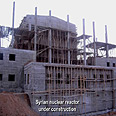
Alleged Syrian nuclear site bombed by Israel (Archives)
Photo: AFP
Syria on Thursday denied hiding nuclear activities from the world and said Israel was the source of suspicious uranium particles found at a Syrian desert complex bombed two years ago by the Jewish state.
The Syrian comments to the International Atomic Energy Agency's board of governors were strongly backed by Iran and came in response to Western demands that Damascus stop stonewalling IAEA attempts to investigate suspicions that it ran covert nuclear programs - some with possible weapons applications.
Shiite Group
Syria is transferring weapons to Hezbollah that it did not dare to hand over before, Senior IDF intelligence official tells Knesset committee Tuesday; PM Netanyahu: Iran creating false impression, we're not seeking confrontation with Syria
While Iran remains the main focus of the board, Syria's refusal to allow IAEA inspectors into the country for follow-up visit to sites possibly linked to secret nuclear work was the principal theme of Thursday's closed board meeting.
A recent IAEA report prepared for the board said for the first time that uranium particles found at the desert facility destroyed by Israeli warplanes in September 2007 indicate possible covert nuclear activities at the site. The finding lent backing to Western allegations that the bombed target was a nearly completed nuclear reactor that Washington says was of North Korean design and meant to making weapons-grade plutonium.
Syria has put forward several explanations for the source of the uranium at the bomb site and of uranium traces found at its Damascus research reactor that IAEA inspectors say would not normally be found at such a facility. One Syrian suggestion - that Israeli munitions used to bomb the desert location contained depleted uranium - has been all but ruled out by the agency.
'Troubling pattern in Syria's behavior'
Delegates inside the meeting told The Associated Press that Bassam Al-Sabbag, Syria's chief IAEA delegate offered a new theory Thursday, suggesting that Israel had dropped uranium particles from the air after the bombing to implicate his country.
Separately, Iranian chief delegate Ali Asghar Soltanieh said Israel - not Syria - should be criticized at the meeting, describing the bombing of the Dair Alzour desert site as "an aggressive act, committed by the Zionist Regime." He accused the US and its allies of making an issue of "a few uranium particles."
But the US and the European Union said the onus was on Syria to disprove suspicions by cooperating with the agency.
IAEA experts inspected the Dair Alzour site in June 2008 but have been barred from revisiting since. Damascus also has turned down requests for visits to three linked sites which have undergone major landscaping work since those requests were made.
The IAEA has also been attempting to probe possible connections between the uranium traces found at the desert site and those detected during a separate 2008 visit at a research reactor in Damascus.
"Over the past two years, we have noticed a troubling pattern in Syria's behavior," Chief US delegate Glyn Davies told the meeting. "The more evidence the agency uncovers that Syria was engaged in serious safeguards violations, the more Syria has tried to actively hinder the agency's investigation."
On behalf of the EU, Spanish chief delegate Jose Luis Rosello expressed deep regret that Syria "has not been cooperative and transparent with the agency."
Reuters contributed to the report















